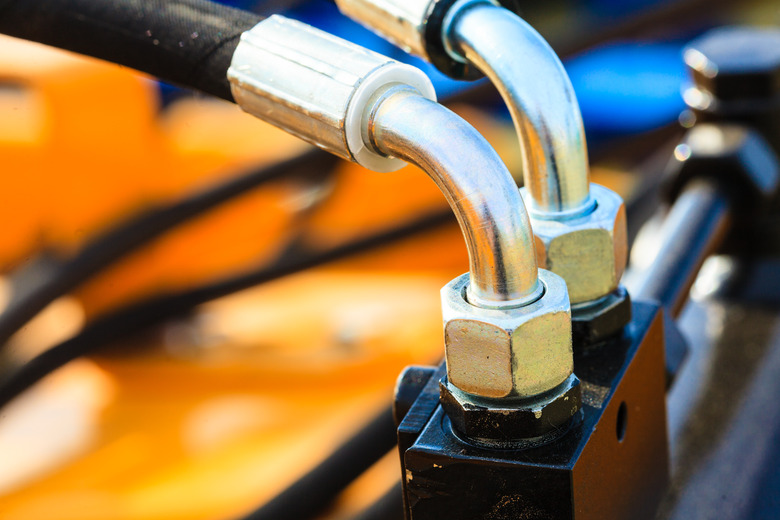Advantages & Disadvantages Of Hydraulic Systems
Hydraulic systems transmit power by utilizing the pressure of fluid within a sealed system. The brakes on cars and trucks, wheelchair lifts, hydraulic jacks and wing flaps on aircraft typically employ hydraulic systems. Many manufacturers use hydraulic systems because they have many advantages over mechanical and electrical systems like offering up a lot of power in a small space, but if the fluid leaks from the system, this creates a problem and a disadvantage in the system, in that it won't work at all.
TL;DR (Too Long; Didn't Read)
Advantages of hydraulic systems include power, accuracy, efficiency and ease of maintenance. But they disadvantages too: they can leak, which makes them messy, and the fluids inside them are often caustic to paint and some seals.
How Hydraulic Systems Work
How Hydraulic Systems Work
Hydraulic systems use liquid to create pressure. Liquid particles are close together, meaning a liquid is almost incompressible. When the particles move, they strike each other and also bump against the walls of the container. Because the pressure in a liquid transfers in equal measure in every direction, a force applied at one point on a liquid transfers to other points on the liquid. You work out the pressure using the equation F ÷ (P x A), where P is the pressure in pascals, F is the force in newtons and A is the cross-sectional area in meters squared. This is known as Pascal's law.
In hydraulic systems, a small force across a small cross-sectional area transmits pressure and creates a large force over a larger cross-sectional area. Essentially, if you connect two cylinders, a large and a small one, and apply force to one cylinder, it generates equal pressure in both cylinders. Because one cylinder contains a larger volume, the force the larger cylinder produces is higher, although the pressure in the two cylinders remains the same.
Hydraulic System Examples
Hydraulic System Examples
A hydraulic system most every driver uses every day, without thinking about it, is the brake system in your vehicle. Other examples include lifting equipment, such as hydraulic jacks and wheelchair lifts, lifting and excavating arms on backhoes and other heavy equipment, hydraulic presses, which produce metal components, and some parts of aircraft and boats, including wing flaps and rudders. Every hydraulic system follows the same basic principle. For example, a hydraulic jack lifts heavy loads with a pump plunger, which moves oil through both cylinders. Pulling the plunger back opens a suction valve ball and takes the fluid into the pump chamber. Pushing the plunger forward sends the fluid into an external discharge check valve, then into the cylinder chamber, closing the suction valve as it builds pressure inside the cylinder.
Hydraulic System Advantages
Hydraulic System Advantages
A hydraulic system is an efficient transmitter of power for many reasons. Firstly, its simple levers and push buttons make it easy to start, stop, accelerate and decelerate. This also allows for control accuracy. Also, because it is such a fluid system, without any cumbersome gears, pulleys or levers, it easily copes with a huge weight range. It provides a constant force, regardless of changes in speed. For the most part, hydraulic systems are simple, safe and economical because they use fewer moving parts compared to mechanical and electrical systems, which makes them easier to maintain. Hydraulic systems are safe to use in chemical plants and mines because they do not cause sparks.
Hydraulic System Disadvantages
Hydraulic System Disadvantages
Hydraulic systems also have some drawbacks. Handling hydraulic fluids is messy, and it can be difficult to totally get rid of leaks in a hydraulic system. If hydraulic fluid leaks in hot areas, it may catch fire. If hydraulic lines burst, they can cause serious injuries. Take care when handling hydraulic fluids, as too much exposure can lead to health issues. Hydraulic fluids are also corrosive, but some types are less so than others. For example, two main types of brake fluid are available for hydraulic mountain bikes, DOT fluid and mineral oil. Due to its non-corrosive properties, mineral oil is less likely to destroy a bike's paintwork. To keep your hydraulic system in its prime, periodically check hydraulic systems for leaks, lubricate when necessary, and change filters and seals as required.
References
- National Fluid Power Association: What Is Fluid Power?
- NASA: Pascal's Principle and Hydraulics
- Agency for Toxic Substances and Disease Registry: Toxicological Profile for Hydraulic Fluids
- Epic Brake Bleeding Solutions: DOT Brake Fluid vs. Mineral Oil – and the Winner is..
- Thomas: How Hydraulic Jacks Work
Cite This Article
MLA
Gillespie, Claire. "Advantages & Disadvantages Of Hydraulic Systems" sciencing.com, https://www.sciencing.com/advantages-disadvantages-hydraulic-systems-7198601/. 11 April 2018.
APA
Gillespie, Claire. (2018, April 11). Advantages & Disadvantages Of Hydraulic Systems. sciencing.com. Retrieved from https://www.sciencing.com/advantages-disadvantages-hydraulic-systems-7198601/
Chicago
Gillespie, Claire. Advantages & Disadvantages Of Hydraulic Systems last modified August 30, 2022. https://www.sciencing.com/advantages-disadvantages-hydraulic-systems-7198601/
